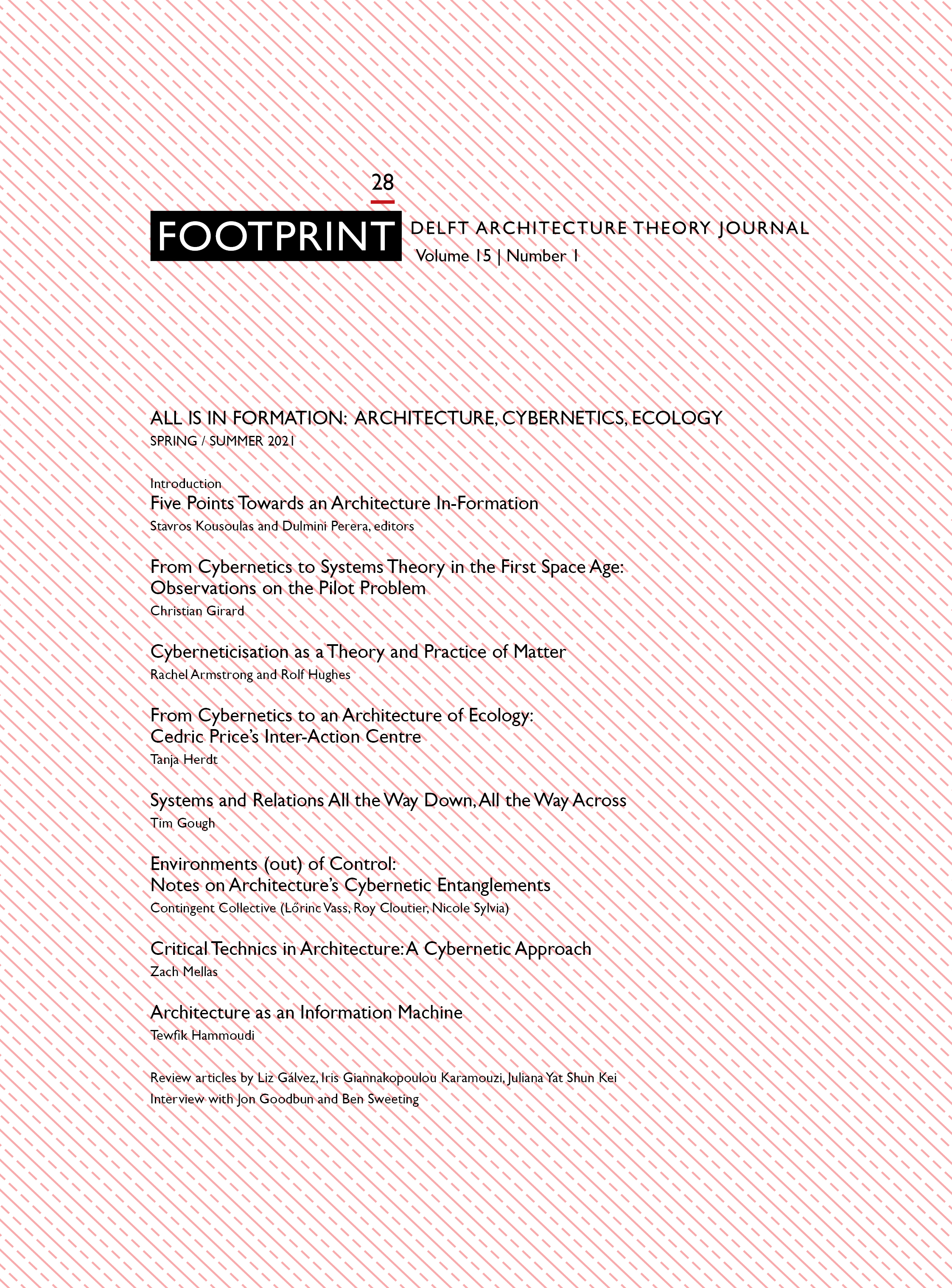Five Points Towards an Architecture In-Formation
DOI:
https://doi.org/10.7480/footprint.15.1.5663Abstract
While there have been significant discussions about the relevance of cybernetics within architectural and urban studies, the focus has mainly been on computing and digital practices. Since its emergence in the post-war period, cybernetics – in both its first and second-order versions – has introduced to architectural discourse systematic design methods and practices, while also tackling issues of reflexivity and complex problems. In this introduction, we examine the relation between cybernetics and architecture by focusing on a problem they both share. To this end, we approach cybernetics as the study of the production, consumption and flow of information, an account that has little to do with digital logics, unless one wants to pursue that special case. Therefore, cyberneticisation can set the foundations for a relational account that examines how signs are communicated and how meaning is produced and experienced within systems. This third-order cybernetics extends beyond the original scope of living organisms and their environments in order to include ecologies of ideas, power, institutions, media and so on. In this sense, cyberneticisation is radically environmental, positing the primacy of relations over fixed terms, binary oppositions and linear logics, making it high time for architectural and urban studies to take into consideration its ground-breaking potentials. By introducing five short points on the relation between architecture and cybernetics, we aim to assist in this endeavour.
References
Barthélémy, Jean-Hugues, Life and Technology: An Inquiry into and Beyond Simondon, trans. B. Norman (Leuphana University of Lüneburg: Meson Press, 2015).
Bratton, Benjamin H., Terraforming (Moscow: Strelka, 2019).
Chabot, Pascal, The Philosophy of Simondon: Between Technology and Individuation, trans. A. Krefetz (London: Bloomsbury, 2013).
Guattari, Félix, Schizoanalytic Cartographies, trans. A. Goffey (London: Bloomsbury, 1989).
Hauptmann, Deborah and Andrej Radman, ‘Asignifying Semiotics as Proto-Theory of Singularity: Drawing is Not Writing and Architecture does Not Speak’, Footprint 14 (2014): 1–12.
Hörl, Erich, ed., General Ecology: The New Ecological Paradigm (London: Bloomsbury, 2017).
Kousoulas, Stavros and Jorge Mejía Hernández, eds., Exploring Architectural Form: A Configurative Triad, Footprint 22 (2018).
Kousoulas, Stavros, ‘Shattering the Black Box: Technicities of Architectural Manipulation’ in Artificial Intelligence and Robotics in Architecture: Autonomy, agency and indeterminacy, International Journal of Architectural Computing, vol. 16, n. 4, eds. A. J. Wit, et al. (London: Sage, 2018).
Lazzarato, Maurizio, Capital Hates Everyone: Fascism or Revolution, trans. R. Hurley (South Pasadena, CA: Semiotexte, 2021).
Muñoz Sanz, Víctor and Dan Handel, eds., The Human Conditioned, Footprint 25 (2019).
Sanaan Bensi, Negar and Francesco Marullo, eds., The Architecture of Logistics, Footprint 23 (2018).
Savranksy, Martin, ‘The Pluralistic Problematic: William James and the Pragmatics of the Pluriverse’ in Special Issue: Problematizing the Problematic, Theory Culture and Society, ed. M. Savransky (London: Sage, 2019).
Simondon, Gilbert, Individuation in Light of Notion of Forms and Information, trans. T. Adkins (Minneapolis: University of Minnesota Press, 2020).
Simondon, Gilbert, On the Mode of Existence of Technical Objects, trans. C. Malaspina & J. Rogove (Minneapolis: Univocal, 2017).
Stiegler, Bernard, The Neganthropocene, ed. and trans. D. Ross (London: Open Humanities Press, 2018).
Downloads
Published
Issue
Section
License
Copyright (c) 2021 Stavros Kousoulas; Dulmini Perera

This work is licensed under a Creative Commons Attribution 4.0 International License.
- Authors retain copyright and grant the journal right of first publication with the work simultaneously licensed under a Creative Commons Attribution License that allows others to share the work with an acknowledgement of the work's authorship and initial publication in this journal.
- Authors are able to enter into separate, additional contractual arrangements for the non-exclusive distribution of the journal's published version of the work (e.g., post it to an institutional repository or publish it in a book), with an acknowledgement of its initial publication in this journal.





